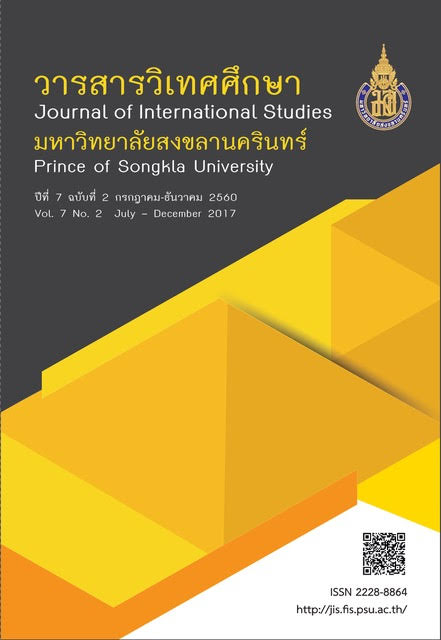Neoliberalism and Welfare State: The comparative case study of Thai and Nordic welfare model for migrant workers 1990-2010
Main Article Content
Abstract
The paper focused on the possible model of welfare protection for migrant workers in Thailand by comparing with Nordic countries’ models. The paper utilizes the welfare convergence model to explain the possibility of the development of welfare provision in Thailand under the globalizing economy. The paper explains how portable welfare is an important policy for transnational workers who are likely to stay in one country on a temporary basis. On the other hand, Nordic Model delivered an integrated and flexibility condition for transnational workers . In comparing Thai and Nordic countries, there are several different concepts which enhance and obstruct development for transnational workers. The paper concluded that the cooperation between host-home countries for welfare provision could offer a long-term solution for transnational worker’s welfare.
Article Details
Statements and opinions expressed in articles herein are those of the authors and do not necessarily reflect the position of the editors or publisher.
Article, information, text, image, etc. which are published in Journal of International Studies, belong to Journal of International Studies. If anybody or any organization would like to use part or whole of them, they must receive written permission from Journal of International Studies before usage.
References
Alves, S. (2015). Welfare State Changes and Outcomes? The Cases of Portugal and Denmark from a Comparative Perspective Social Policy & Administration Volume 49, Issue 1. Social Policy & Administration, 49(1), 1-23.
Annuska, D. (2013). Human Rights and (Im)mobility: Migrants and the State in Thailand. SOJOURN: Journal Of Social Issues In Southeast Asia, 28(2), 216-240.
Bergh, A. (2012). Beyond Welfare State Models ? Transnational Historical Perspectives on Social Policy ? Edited by Pauli Kettunen and Klaus PetersenInternational Journal of Social Welfare Volume 21, Issue 3. International Journal of Social Welfare, 21(3), 319-320.
Castles, S. and A. Davidson (2000). Citizenship and migration; globalization and the politics of belonging.
Dahl, E., Drøpping, J. A., & Lø, I. (2001). Norway relevance of the social development model for post-War welfare policy, International Journal of Social Welfare, 10(4), 300-308.
Diamond, P., & Lodge, G. (2014). Dynamic Social Security after the crisis Towards a new welfare state?, International Social Security Review, 67(3-4), 37-59.
Esping-Andersen, G. (2015). Welfare Policy Comparisons. n.p.: 2015. Gale Virtual Reference Library.
Glassman, J. (2007). Recovering from Crisis: The Case of Thailand's Spatial Fix. Economic Geography, 83(4), 349-370.
Hagstrom, B. (1994). The Nordic Conference on Medical Care for persons with Mental Retardation, Hässelby Castle, Stockholm, Journal of Intellectual Disability Research, 38(2), 209-215.
Harvey, D. (2003). The new imperialism / David Harvey. Oxford: Oxford University Press, 2003.
Holmwood, J. (2000). Three Pillars of Welfare State Theory: T.H. Marshall, Karl Polanyi and Alva Myrdal in Defence of the National Welfare State. European Journal Of Social Theory, 3(1), 23.
Jessop, B. (2013). Putting neoliberalism in its time and place: a response to the debate. Social Anthropology, 65.
Jochem, S. (2011). Nordic Employment Policies ? Change and Continuity Before and During the Financial Crisis Social Policy & Administration, 45(2), 131-145.
Lawson, V. (2012). Decentring poverty studies Middle class alliances and the social construction of poverty.
Singapore Journal of Tropical Geography, 33(1), 1-19.
Standing, G. (2011). The Precariat: The New Dangerous Class. London: Bloomsbury Academic.
Standing, G. (2012). ‘The precariat: From denizens to citizens?’ Polity, 44, 4, pp. 588–608.
Tangcharoensathien,V. Thwin Aye Aye, and Patcharanarumol Walaiporn. 2017. "Implementing health insurance for migrants, Thailand." Bulletin Of The World Health Organization 95, no. 2: 146-151. CINAHL Complete,
EBSCOhost (accessed January 4, 2018).
Thammaboosadee S, Somboon V. (2012) Researching the Neoliberal Underclass—Burmese Workers in Thailand.
Transnational Social Review – A Social Work Journal [serial online]. January 1, 2012;2(1): M7-M18


